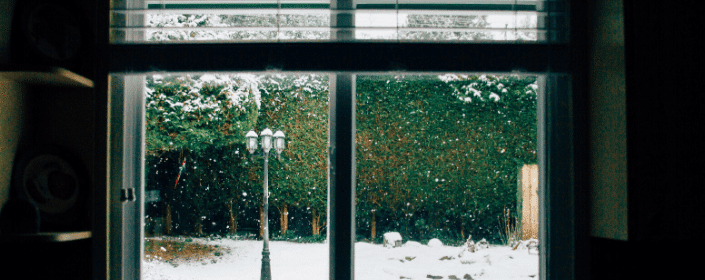Tips to Help You Find the Best Windows for Cold Weather
It’s no secret that while beautiful and picturesque, Canadian winters tend to be long, drawn-out, and bitterly cold. And without the right windows, your home can be bitterly cold too.
Escaping the cold in winter is a must for our comfort and safety. And with windows that aren’t winter-ready, you’ll need to crank up the heat and spend a fortune on heating bills all winter long. Otherwise, you’ll risk freezing and you’ll need to bundle up inside.
So to avoid all of the above unpleasant scenarios, why not enjoy being cozy and warm at home this winter—without needing to crank up the heat—by choosing the best windows for cold climates.
Here are tips for selecting the ideal windows that will get you through the most brutal Canadian winters.
Importance of Choosing the Right Windows for a Colder Climate
Choosing the best windows for winter in colder climates is crucial to maintain comfortable indoor air temperatures, reduce chills, and keep energy costs down.
Energy-efficient winter-ready windows prevent heat loss in winter, avoid moisture damage, and increase the value of the home.
How to Choose Windows for Canadian Winters
The best windows for cold climates keep out cold air and moisture and won’t let warm air escape from the home.
So to ensure that your windows will help keep your home cozy in winter, consider these tips when shopping for new windows:
Choose Energy-Efficient Window Frames
The most energy-efficient windows for cold climates have window frames that don’t allow air leaks. The most common window frame materials are aluminum, fibreglass, vinyl, and wood.
While low-maintenance and durable, aluminum frames are conductive, allowing for heat transfer. So aluminum on its own is the least energy-efficient option for winter. If you’re opting for aluminum frames, choose aluminum hybrid instead.
Wood frames are considered energy-efficient since they don’t allow heat transfer. But these frames can expand and contract with temperature and humidity changes, and they can rot if exposed to moisture. Wood frames also tend to come at a higher cost and require plenty of maintenance.
Composite frames are the best option for Canadian winters. Fibreglass frames are durable and efficient at preventing heat transfer. And vinyl frames are the most cost-effective, low-maintenance, and energy-efficient option, keeping heat out in summer and in during winter.
Proper Glass Selection
With the wrong glass, heat can easily escape through your window panes in winter. So to reduce heat loss from your windows and keep your heating costs down, consider the following factors when selecting the best glass type for your windows:
[su_list icon=”icon: chevron-right” icon_color=”#EC3826″]
- Multiple panes—also known as double- and triple-glazed windows, these windows provide better insulation compared to single-pane windows. Double- and triple-glazed windows use a spacer system to prevent condensation from forming between the panes. The multiple panes create a vacuum to maximize insulation and reduce energy loss. These windows also use inert gas (such as argon, krypton, or xenon) between the panes for additional insulation.
- Low-E (emissivity) glass—uses an invisible metallic oxide coating to reflect heat and prevent heat transfer from warm to cool environments. For cold climates, windows should have Low-E coatings on the external side of the innermost glass.
- Solar Heat Gain Coefficient (SHGC)—the amount of solar heat that passes through the window glass. The recommended SHGC value for window glass in cold climates is 0.55.
- U Value—the total rate of heat transfer. The lower the U Value of a window, the better for Canadian winters, with a recommended value of 0.33 or less.
- Visible Transmission (VT)—the amount of daylight that passes through the glass, with higher VT values recommended for cold climates.
[/su_list]
Brand Recommendations
When choosing the most energy-efficient window styles for Canadian winters, the Gamma, Unica, and Europa brands are leaders in energy performance. These windows are Energy-Star certified, available in double-glazed and triple-glazed options, use Climaguard Low-E glass and have a dual-seal insulating glass spacer system to maximize insulation.
Tips for Preparing Your Windows for the Winter Season
When preparing windows for winter, inspect your windows for the following and make any necessary repairs to ensure your windows are ready for winter.
Inspect the Caulking on the Outside of the Window
Caulking helps seal windows. So if the caulking is old or in bad shape—cracked, sloppy, falling apart, or falling off—you could experience heat loss through your windows. Replacing damaged caulking is a cheap and easy fix to help seal your windows for winter.
Examine the Quality of Weatherstripping
Over time, weatherstripping wears down on windows. And quality weatherstripping is also crucial for a tight window seal. So inspect the weatherstripping and replace if needed. This is another simple and cost-effective fix for winter-ready windows.
Check Windows for Ease of Operation
Check that your windows operate with ease, testing the cranks, handles, and latches. If you are straining to open and close your windows, they may not close well and have a good enough seal for winter. If that’s the case, then consider window repair or replacement.
Ensure the Healthiness of Your Frames
Older window frames can warp with the fluctuation in seasonal temperatures and deteriorate over time. So inspect the condition of your window frames, especially the corners and joints. If the frames are in poor condition, you’ll need to update them to prevent air leaks in winter.
Monitor Humidity Levels in Your Home
Windows are more likely to have condensation in winter. So to control humidity in your home and prevent condensation, turn down the thermostat by a couple of degrees. And make sure to run exhaust fans while cooking and showering, and leave them on for up to 20 minutes after as well.
If your windows need repairs or replacement to keep your home comfortable this winter, contact the window pros. They can help you find the best windows to keep your home warm and cozy—without cranking up the heat—all winter long.


